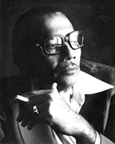Das, Samar

Das, Samar (1925-2001) composer of music, instrumentalist, music director. He was born on 10 December 1925 at Luxmibazar in Dhaka. His father was Jitendranath Das and mother Kamalini Das.
Samar Das grew up in musical atmosphere of the family. First he learnt to play on violin from his father. Then he learnt to play on piano, guitar and flute from a missionary named North Field.
After the partition of India in 1947, two music directors and composers of music played a key role in developing a musical environment in Dhaka. Samar Das was one of them. In 1945 he joined the Dhaka station of All India Radio as a flute player. He also worked as an instrumentalist at Calcutta station of All India Radio and at the HMV Gramophone Company.
At HMV he came in contact with the well-known composers and singers like Kamal Dasgupta, Anupam Ghatak and Kalipada Basu. This association greatly influenced Samar Das in pursuing his musical career. Samar Das joined the Dhaka Radio in 1951 and later in 1961 he became a Staff Artiste in the Dhaka station of the Radio Pakistan. In 1966 he worked for some time in Karachi as head of the music department at the Pakistan International Airlines Cultural Institute. As the film industry developed in East Pakistan, he became associated with it as director of music. He played an important role as chief music organiser and director at Swadhin Bangla Betar Kendra during the war of liberation movement of Bangladesh. It provided an ample opportunity for him to demonstrate his multi-faceted talent.
Samar Das jointly directed music at the South Asia International Music Conference held in Dhaka in 1954 and in the films Mukh O Mukhosh (1955) and Lottery. Some other early films with Samar Das as music director were Matir Pahar, Aasia, Gouri, Dhire Bahe Meghna, and Raja Elo Shahare. He was the director of music in the dance-drama Nodir Sontan, Nobarun, Birabgana Sakhina, and Sonar Sabuj Gaye. He produced and directed music of dance-drama Sonar Sabuj Gaye at the Afro-Asian Music Conference held at Lahore in 1964, and directed the dance-drama Sons of River at the Commonwealth Festival in 1966 in London. Samar Das was also known for his human qualities. He was the main organizer of a musical event Kando Babgali Kando held at Paltan Maidan to raise fund for relief of the victims of the devastating cyclone in the coastal belt of Bangladesh in 1970.
In 1972 HMV of Calcutta produced a long-playing record Bangladesher Hriday Hote containing 26 songs based on the war of liberation of Bangladesh. Samar Das was its music director. The same year he went to London to get the orchestration of the national anthem of Bangladesh recorded at the studio facilities of BBC. Samar Das composed the signature tune of the newly-established Bangladesh Betar. As director of music he made the efforts of the Muktijoddha Kalyan Trust to release two long-playing records entitled Mora Ekti Phoolke Bachabo Bole Juddha Kori a success. In 1993 he composed music for the opening and closing songs of the South Asian Federation Games in Dhaka.
Samar Das was associated with the Shilpakala Academy and several other important cultural organisations. He visited a number of countries as a member or as leader of troupes of artistes. A good number of songs with his composed tune gained vast popularity.
For his contribution to music Samar Das was awarded the highest state honour, The Independence Day Award in 1997. He died on 25 September 2001. [Khalid Hasan Komol]
